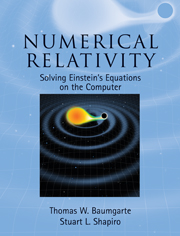Book contents
- Frontmatter
- Contents
- Preface
- Suggestions for using this book
- 1 General relativity preliminaries
- 2 The 3 + 1 decompostion of Einstein's equations
- 3 Constructing initial data
- 4 Choosing coordinates: the lapse and shift
- 5 Matter sources
- 6 Numerical methods
- 7 Locating black hole horizons
- 8 Spherically symmetric spacetimes
- 9 Gravitational waves
- 10 Collapse of collisionless clusters in axisymmetry
- 11 Recasting the evolution equations
- 12 Binary black hole initial data
- 13 Binary black hole evolution
- 14 Rotating stars
- 15 Binary neutron star initial data
- 16 Binary neutron star evolution
- 17 Binary black hole–neutron stars: initial data and evolution
- 18 Epilogue
- A Lie derivatives, Killing vectors, and tensor densities
- B Solving the vector Laplacian
- C The surface element on the apparent horizon
- D Scalar, vector and tensor spherical harmonics
- E Post-Newtonian results
- F Collisionless matter evolution in axisymmetry: basic equations
- G Rotating equilibria: gravitational field equations
- H Moving puncture representions of Schwarzschild: analytical results
- I Binary black hole puncture simulations as test problems
- References
- Index
12 - Binary black hole initial data
Published online by Cambridge University Press: 05 March 2013
- Frontmatter
- Contents
- Preface
- Suggestions for using this book
- 1 General relativity preliminaries
- 2 The 3 + 1 decompostion of Einstein's equations
- 3 Constructing initial data
- 4 Choosing coordinates: the lapse and shift
- 5 Matter sources
- 6 Numerical methods
- 7 Locating black hole horizons
- 8 Spherically symmetric spacetimes
- 9 Gravitational waves
- 10 Collapse of collisionless clusters in axisymmetry
- 11 Recasting the evolution equations
- 12 Binary black hole initial data
- 13 Binary black hole evolution
- 14 Rotating stars
- 15 Binary neutron star initial data
- 16 Binary neutron star evolution
- 17 Binary black hole–neutron stars: initial data and evolution
- 18 Epilogue
- A Lie derivatives, Killing vectors, and tensor densities
- B Solving the vector Laplacian
- C The surface element on the apparent horizon
- D Scalar, vector and tensor spherical harmonics
- E Post-Newtonian results
- F Collisionless matter evolution in axisymmetry: basic equations
- G Rotating equilibria: gravitational field equations
- H Moving puncture representions of Schwarzschild: analytical results
- I Binary black hole puncture simulations as test problems
- References
- Index
Summary
In this chapter we wish to construct initial data for quasiequilibrium binary black holes. That is, we seek solutions corresponding to two black holes in stable, nearly circular orbit about each other. In contrast to Newtonian theory, a stellar binary in general relativity can never be in strict equilibrium, with the companions moving in exactly circular orbits at constant separation for all time. Instead, gravitational radiation emission inevitably leads to loss of orbital energy and angular momentum, causing the orbit to decay. The resulting trajectory then traces out an inspiral rather than a perfect circle. For sufficiently large separations, the binary motion is nearly Newtonian, hence the orbit is nearly circular, decaying very little during one orbital period. If isolated from outside perturbations (e.g., gravitational encounters with other stars), it is expected that astrophysical binaries composed of compact stars (i.e., compact binaries) will ultimately evolve to a quasiequilibrium state following their formation at large separation. The reason is that gravitational radiation loss drives orbital circularization as well as decay, as we will discuss in the next section. Only when the orbits become very close and highly relativistic, just prior to radial plunge and binary merger, do the deviations from circular motion become large.
The construction of quasiequilibrium binary initial data poses a number of conceptual challenges. Getting started, however, is fairly straightforward. To find solutions we shall follow the approaches outlined in Chapter 3.
Information
- Type
- Chapter
- Information
- Numerical RelativitySolving Einstein's Equations on the Computer, pp. 394 - 428Publisher: Cambridge University PressPrint publication year: 2010
